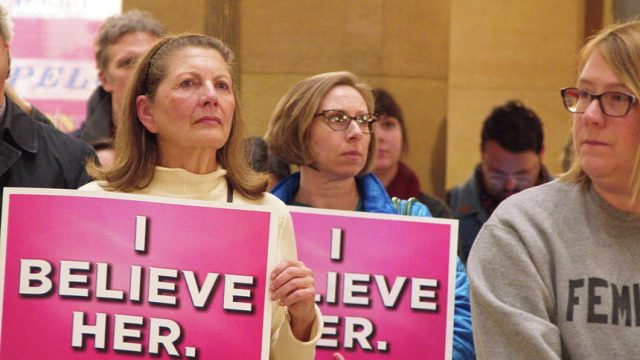What if Sexual Harassment Wasn’t Just About Gender?

Pauline Wahl of Maple Grove, Minn., left, attends a Friday, Nov. 17, 2017, rally in the Minnesota Capitol about sexual assault prevention. Don Davis / Forum News Service
My Sunday print column was about the #MeToo movement. I argue that, while it’s a positive thing that victims are now speaking out, we must be careful to ensure that innocent people are protected from false accusations.
I got a lot of criticism, which didn’t surprise me, and a lot of it made broad generalizations about men. The assumption a lot of people seem to be making is that there’s something inherent to the male gender which makes them, overwhelmingly, the perpetrators of inappropriate and even illegal sexual behavior.
That’s unfair to the millions upon millions of men who don’t harass or grope or assault.
Maybe the problem isn’t just gender but power too.
It can be hard to extricate the two issues – historically men have wielded more power in society than women – but for the sake of understanding the sexual harassment issue we should. Because it sure seems as though, when women have power, they have a propensity to become abusers too.
[mks_pullquote align=”right” width=”300″ size=”24″ bg_color=”#ffffff” txt_color=”#000000″]Since 2014 there have been six high-profile cases of inappropriate sexual activity between educators and students right here in North Dakota. Of those cases, four of the perpetrators were women and two were men.[/mks_pullquote]
Take a look at K-12 education, which is a female-dominated profession. Thirty years ago about two thirds of educators in America were women. As of 2014, about 75 percent of educators were female.
Yet even as classrooms have become increasingly dominated by women, instances of teachers engaging in inappropriate sexual behavior with students has also risen.
Since 2014 there have been six high-profile cases of inappropriate sexual activity between educators and students right here in North Dakota. Of those cases, four of the perpetrators were women and two were men.
The women in those cases got much lighter sentences then the men did, by the way, but I digress.
Nationally male educators are still guilty of most of the inappropriate sexual behavior with students – in 2014, the most recent year for which data is available, women made up about a third of the roughly 800 convictions – but that’s a substantially higher rate for female involvement in sexual misconduct overall.
About 10 percent of sex crimes are committed by women nationally.
Why the difference? It’s probably because so many educators are women.
There is an extremely lopsided power dynamic between teachers/coaches and students. One that hundreds of educators exploit each year to satisfy their sexual urges, with a very large percentage of them women.
The point? It’s not just men who can be abusive when in positions of power over others. That’s something worth remembering as we move forward.




